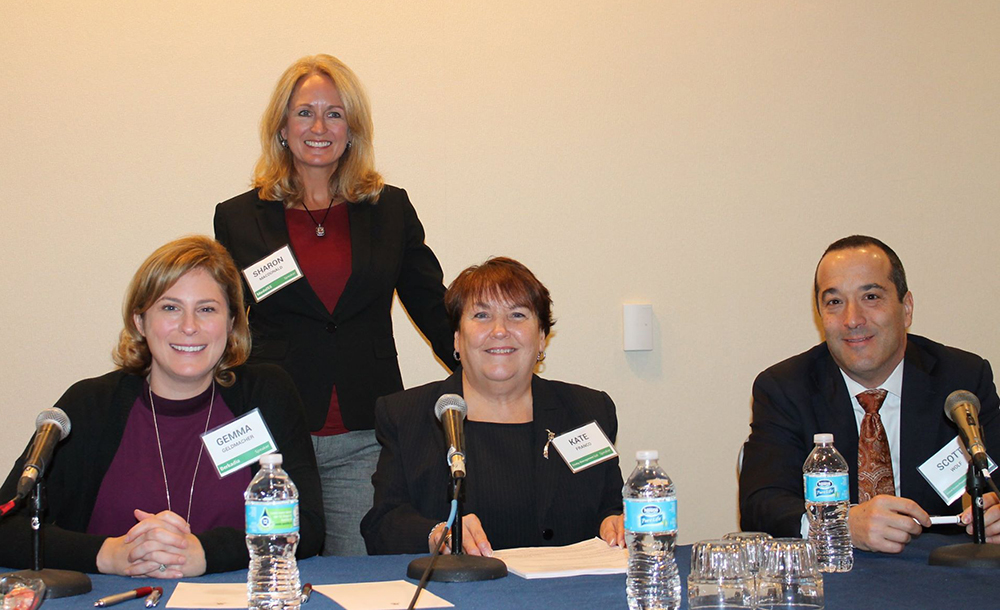 Newton, MA Despite the enormous amount of apartment and condominium construction in Greater Boston in recent years (13,000 new units added in 2015-2016), multifamily rental demand and investment sales activity have remained strong in the region. The vacancy rate for Greater Boston remains below 3%, rents have increased by 6% in 2016, and cap rates for class A investment properties are hovering around the 5% mark. The New England Real Estate Journal (NEREJ) recently held its second Multi-Family & Residential Summit of 2016 at the Boston Marriott Newton Hotel to discuss the robust multifamily market, and the event featured four stellar panels who drilled down on a comprehensive slate of topics including development, financing, property management, insurance and legal issues.
Newton, MA Despite the enormous amount of apartment and condominium construction in Greater Boston in recent years (13,000 new units added in 2015-2016), multifamily rental demand and investment sales activity have remained strong in the region. The vacancy rate for Greater Boston remains below 3%, rents have increased by 6% in 2016, and cap rates for class A investment properties are hovering around the 5% mark. The New England Real Estate Journal (NEREJ) recently held its second Multi-Family & Residential Summit of 2016 at the Boston Marriott Newton Hotel to discuss the robust multifamily market, and the event featured four stellar panels who drilled down on a comprehensive slate of topics including development, financing, property management, insurance and legal issues.
Albert LaValley, president of green building and energy efficiency consulting firm Sustainable Comfort, Inc., kicked off the discussions, moderating a panel that examined current market conditions. The group included Dennis Kelleher, vice president at Horvath and Tremblay; Doug Root, co-founder and managing partner of Blackfin Real Estate Investors; Bill Lovett, senior development manager for Toll Apartment Living (a subsidiary of Toll Brothers); and P.T. Vineburgh, founding partner of the Charlesgate Realty Group.
Root said his firm was “super aggressive” coming out of the recession, “buying everything we could get our hands on,” to take advantage of the significant rent growth that has occurred in last five years. The firm then turned their focus to class A product in the core market for a few years, and is now employing a value-add strategy to meet demand in the workforce housing market. Toll Apartment Living entered the Greater Boston market approximately 2.5 years ago and is developing properties with JV partners with an eye towards long term holds, including a recently completed 249-unit luxury apartment community located in Westborough, Mass. Assessing the current market, Kelleher noted that “investors are being more conservative with their pro formas (when purchasing assets) – especially in the core,” but are becoming more aggressive in the secondary and tertiary markets in the past 6-12 months because of the scarcity of deals in the core.
The second panel centered on financing, and featured Patricia Flowers, VP at Investment Property Exchange Services, Inc.; Michael Wiseman, VP at Norwood Bank; Matthew Nelson, VP and manager of the small balance loan program at the Community Preservation Corp.; and was moderated by Bob Allaire, senior advisor at Licata Risk Advisors. Nelson spoke of his firm’s role in helping to transform underserved neighborhoods into thriving and vibrant communities by collaborating with government agencies, local community groups, banks, and other lenders to create affordable and low-income housing. Wiseman discussed how Norwood Bank leverages local expertise and flexible platforms to better serve borrowers, and Flowers gave a primer on how property owners (particularly non-institutional owners) can “keep their equity working for them” through the use of 1031 changes.
Model55 CEO Sharon MacDonald moderated a discussion of “Multi-Family, Condominiums, High End and Affordable Housing,” with a panel that featured Kate Franco, CEO of property management firm Trinity Management; Scott Wolf, CEO of Greater Boston Properties, Inc., which manages both rentals and condominium complexes; and Gemma Geldmacher, senior director of mortgage banking at Berkadia.
Wolf said that one emerging trend in property management in the last five years is the recognition of the need for education in the industry, beginning with the licensing of professionals. “Right now there is no licensing in our industry. Hairdressers need licenses, yet here we are managing millions of dollars in properties and nobody cares whether we have a license or what our backgrounds are,” he said. So management companies are beginning to push to get a licensing system in place. He also believes that condo buyers need to be educated more thoroughly on their responsibilities as owners. “If I had my druthers, any new buyer of a condominium would have to take a class before buying so they knew what they’re getting into,” he said.
Franco told the crowd that there has been a shift in what residents are seeking when looking an apartment. “The primary concept of our business is the triple Ls – location, location, location, and that still holds true today,” she said. “But it’s taking on a new depth to it, the triple C’s – conscientious, convenient and clickable.” As developers expand beyond the constrained cities to build more units, they need to be more sensitive to the culture of the locations they are expanding into, she asserted. They also need to be more conscious of how technology integrates into the changing design of the new, smaller units, while also incorporating eco-friendly elements to satisfy market demand.

Geldmacher cautioned that some lenders are operating with an eye towards a possible market downturn, which could be detrimental to their business. “There has been a lot of planning for the downside, and in the past five years, there really hasn’t been a downside yet,” she said. “So if you’re in a place where you’re not staffing appropriately for where you are (as a lender) because you’re expecting a downturn, that may come back to bite you.”
 The final session of the day addressed legal and insurance matters, particularly in the area of property management. Moderated by David Barrett, president of RCM Services, the panel featured Frank Flynn, managing partner of the Flynn Law Group; Warren Lizio, regional real estate manager of The Simon Companies; and Rob Barresi, assistant VP at Starkweather & Shepley Insurance Brokerage Inc. The panel covered a myriad of topics, including some lively discussions regarding the impact of Airbnb and medical marijuana legislation. Flynn was adamant about the potential damaging effects that Airbnb can have on property owners when tenants begin renting out there apartments to unvetted parties, and was right to the point on the best way that they can protect themselves. “This is an important issue that you should begin preparing for, and I think the best way is to revise your lease, and revise the rules, to outlaw this practice,” said Flynn.
The final session of the day addressed legal and insurance matters, particularly in the area of property management. Moderated by David Barrett, president of RCM Services, the panel featured Frank Flynn, managing partner of the Flynn Law Group; Warren Lizio, regional real estate manager of The Simon Companies; and Rob Barresi, assistant VP at Starkweather & Shepley Insurance Brokerage Inc. The panel covered a myriad of topics, including some lively discussions regarding the impact of Airbnb and medical marijuana legislation. Flynn was adamant about the potential damaging effects that Airbnb can have on property owners when tenants begin renting out there apartments to unvetted parties, and was right to the point on the best way that they can protect themselves. “This is an important issue that you should begin preparing for, and I think the best way is to revise your lease, and revise the rules, to outlaw this practice,” said Flynn.











